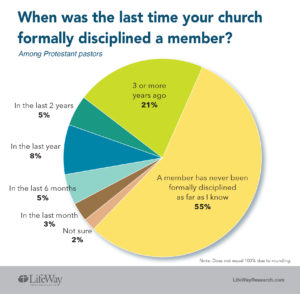Experience and new research show that churches aren’t punishing morally wayward members like they once did.
“There is less discipline overall,” said George Bullard, a veteran church and clergy consultant and director of missions for the Columbia Metro Baptist Association in South Carolina.

George Bullard
Bullard bases his observations on years of working closely with congregations and faith leaders struggling through difficult times and situations. But new research backs up that assessment.
LifeWay Research published a survey last month describing formal church discipline as “rare.”
Matthew 18 describes a process in which Christians are to privately ask offenders to repent and then, if necessary, take the case to the entire congregation. First Corinthians 5 urges believers to avoid fellow Christians if they are engaged in immoral behaviors related to sex, drunkenness, idolatry and stealing.
Few churches formally employ those passages anymore.
“More than 8 in 10 Protestant senior pastors say their church has not disciplined a member in the past year,” the organization reported in an April 5 article. “More than half say they don’t know of a case when someone has been disciplined.”
LifeWay Research Executive Director Scott McConnell said discipline is “one of the topics that churches rarely talk about.”

Scott McConnell
When congregations do impose biblical penalties on members, it’s usually for breaking theological ranks, said Bullard, author of Every Congregation Needs a Little Conflict.
“It’s more likely for heresy,” he said, adding that most punishments these days are handed out privately.
Breaking social or moral norms is rarely the cause for discipline, he added.
“I see a lot of younger adults who have a pretty strict doctrinal perspective, but at the same time alcohol is wide open and even co-habitation before marriage is wide open,” Bullard said.
“A lot of the mores have shifted, so it’s hard to figure out what discipline is.”
The LifeWay Research survey found that Pentecostal, Holiness and Baptist pastors were most likely to report the disciplining of a church member within the past 12 months. Methodists and Presbyterian/Reformed ministers were less likely to report such action.
But whether a church is conservative or liberal is not always a predictor of the use of biblical punishment, Bullard said.
“It has to do with the more authoritative the theology is, and that can be at both progressive and conservative churches,” he said.

Bullard recalled working with a progressive church in New Jersey that was in the process of disciplining members who took scripture too literally.
“Conservative churches can be negative toward people if they are doctrinally too liberal, and liberal churches can chastise those who are too conservative,” he said.
But even those cases are increasingly rare because most Christians attend churches that are a theological fit.
“There are enough choices for people that they will attend one that is closest to their doctrinal interpretation,” Bullard said. “Therefore, they don’t often find themselves outside the church’s disciplinary tolerance.”
In its survey, LifeWay Research asked ministers about discipline processes. In most cases, elders are responsible for discipline, followed by pastors, trustees or board members and then deacons.
More than half said two or more groups must agree to the discipline, while less than 19 percent said there is no formal process at all, according to the LifeWay Research article.


